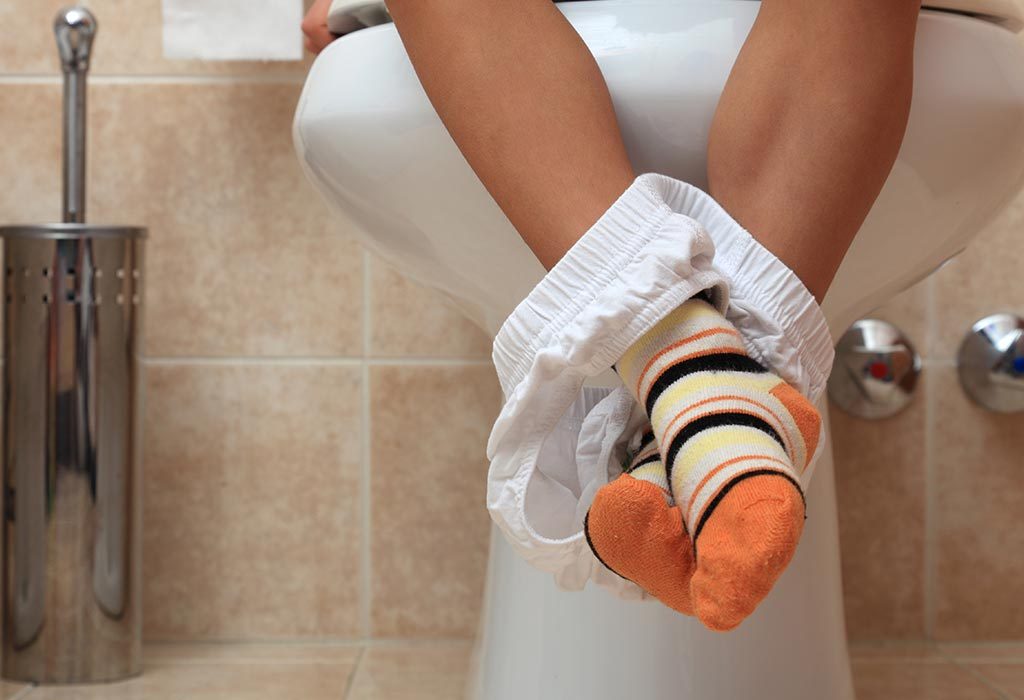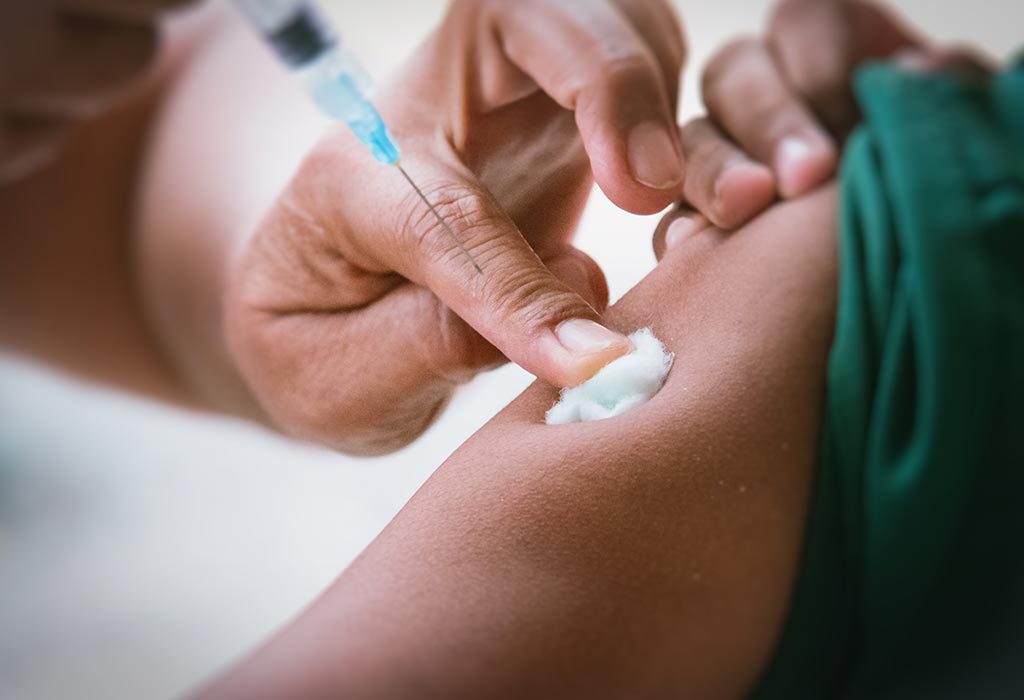In this Article
Your child’s mental and physical well-being must be your top priority. And we are sure you must be doing everything you can to keep your child safe and healthy. But we all fall sick and so do our children. Sometimes, children may suffer from serious health problems, which may require immediate medical attention. Typhoid, for instance, is a bacterial infection that can affect children. The symptoms of typhoid appear very quickly. Read this article to know more about typhoid, its symptoms, and treatment options.
What Is Typhoid Fever?
Typhoid fever is caused by Salmonella typhi infection. It spreads from one person to another, but if it is diagnosed early, it can be treated and it won’t be fatal. The infection often contracts upon consuming contaminated water or food and is seen frequently among children. Once contracted the infection first and foremost manifests as a high fever which is persistent and gradually rises from 102°F up to 107°F.
What Causes Typhoid in Children?
Children may suffer from a typhoid fever if they do not maintain proper hygiene. A person suffering from acute typhoid can pass on the bacteria through stools, where the bacteria may survive for weeks in the sewage. Adults are generally carriers of the pathogen, which they then pass it on through stools or urine.
Here are the causes of typhoid to watch out for and prevent:
- Eating contaminated food.
- Drinking contaminated water.
- Poor hygiene, for instance, if hands are not washed frequently especially after using the bathroom and before eating it can cause typhoid.
- Eating in places close to the sewage from dirty street vendors.
- Eating vegetables and fruits which are not thoroughly washed.
- People who have typhoid and who sneeze and cough can contaminate the food around them.
What Are the Symptoms of Typhoid in Kids?
The symptoms of typhoid may take a week or two after the infection to appear, which may range from mild to severe. Some of the symptoms are given below –
1. High Fever
If your child has contracted the typhoid infection, the first and foremost symptom you will notice is a high fever. Typhoid fever may start as mild but it can build up over the course of a few days. This fever may last for a long time.
2. A Sore Throat
Having a sore throat is another symptom of typhoid in kids. If your child complains of discomfort in the throat and it is quite painful, he may have typhoid.
3. Fatigue and Weakness
Feeling extremely tired and exhausted for a long period of time despite getting good sleep can also be a sign of typhoid. Sometimes, children are so exhausted from the infection that they cannot even get up or sit without support.
4. Loss of Appetite
If you notice that your child is not showing any interest in eating food and refuses to eat, and has a sore throat, then it may mean that the infection is present and persistent.
5. Diarrhoea
Children who are infected with typhoid may have a high fever accompanied by diarrhoea or loose motions sometimes.

6. Abdominal Pain
If your child complains of acute pain in the stomach, then chances of typhoid are quite high.
7. Constipation
If your child has difficulty passing stools and feels bloated for days, then it is a sign of typhoid infection. Yes, both can happen.
8. Headaches
Your little one could also complain of feeling heavy in the head in addition to a prolonged headache which could be due to the infection.
9. Swollen Belly
Some children may also have a swollen belly if they have typhoid. If you have noticed your child with a swollen belly, take him to a doctor immediately to get him checked for typhoid.
10. Coated Tongue
If your child complains of a sore throat, check his tongue immediately to see if it is coated. If it is, then it another sign of an infection.
Who Is At the Risk of Getting Typhoid?
Children exposed to the following factors have a high chance of developing typhoid:
- Poor access to clean drinking water
- Infrequent washing of hands before having a meal
How Is Typhoid Fever Diagnosed?
If you have noticed one or more of the signs in your child such as high fever, swollen belly, rashes, your child may have typhoid fever. You must take him to a doctor to get the condition diagnosed.
- The doctor firsts ask for the symptoms related to the infection.
- The doctor will then check for high fever, rashes, and a coated tongue.
- The doctor will ask for medical history as well to confirm if there are any other complications.
- In addition, the doctor will suggest a blood test to diagnose typhoid fever. He may also suggest a stool or urine sample and test them for the bacteria to diagnose typhoid.
How Is Typhoid Treated in Children?
It is important to get typhoid treated in the early stages or it can prove to be fatal. Your child’s doctor will suggest a blood test to diagnose the condition and depending on the blood test result, he may suggest an antibiotic, which should ideally be taken daily for 7 days. You must make sure that your child takes the entire course of medicines even if he feels better. If you stop the course of treatment in between, chances are that some bacteria would remain in your child’s body and he may fall sick again.
Apart from giving medicines to your child, you should also offer him plenty of fluids to prevent dehydration in him. Make him stay at home and take rest until he recovers completely and the bacteria is gone. There is also a preventive vaccine that can be given along with a booster, but the best thing you can do is to keep your child in a clean environment.

Complications of Typhoid Fever in Children
If the symptoms of typhoid or the infection are not addressed immediately, they can lead to several complications in children. If your child doesn’t get the antibiotics on time, it can prove to be fatal. Here are some complications that may arise if the typhoid fever persists for long in your child.
- By the third week of the infection, the complications start to show very severely. One of them is internal bleeding in the digestive system.
- Internal bleeding leads to pale skin, breathlessness, vomiting blood, passing dark or tar-like stools.
- Perforation is the splitting of a section in the intestines, which results in septic shock. This is serious and a dangerous complication that may arise because of typhoid.
Can Typhoid Be Prevented?
The first thing you should do is make sure that your child washes his hands before and after eating and after using the toilet. He should follow healthy hygiene practices and stay in a clean, hygienic environment, free of most infections. This doesn’t mean that you do not allow your children to play outside, but you should take certain precautions to ensure typhoid is prevented.
- Offer him cooked food – Make sure that you make your child eat only cooked food and nothing raw. For instance, if your child wants to have meat, cook it before giving it to him. He should not consume raw meat as it may lead to health problems. Avoid giving him street food and packaged food. Street vendors may cook food in unhygienic places, so you better avoid taking the risk. Raw fruits should also be not given to kids. While making a vegetable or vegetable curry for your child, first clean the veggies well and cook them well before giving it to your child. When it comes to giving him dairy products, make sure you offer him only pasteurised dairy products and eggs.
- Ensure that he has access to clean drinking water – As a parent, it is your responsibility to take care of your little one. If you want to prevent your child from illnesses, you should take preventing measures. To prevent typhoid, you must make sure that he drinks only sterilised and clean water. You can even boil the water before giving it to your child.
- Make sure he washes his hands thoroughly – Make sure your child always washes his hands with soap and warm water after using the bathroom and before and after having meals. You can also ask him to use a sanitizer if needed. Get him into the habit of washing hands and feet as soon as he steps into the house after playing outdoors.
If typhoid is not treated well in time, it can lead to serious, life-threatening complications in your child. So take your child to a doctor immediately if you notice any of the symptoms mentioned above. Also, maintain hygiene in your house to prevent it from spreading. Maintain hygiene and keep health problems at bay.









